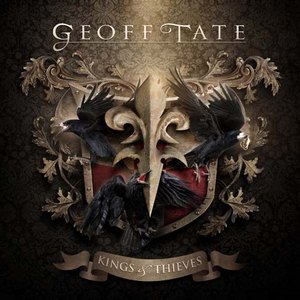
Album Review: Geoff Tate - Kings & Thieves
Geoff Tate's second solo album arrives at a time that long seemed impossible. The erstwhile leader of Queensrÿche, his voice was more than synonymous with the band's legacy. To think of Queensrÿche without Tate was absurd, because no band could survive losing not only its public face, but also the member most responsible for shaping the trajectory of their career. To lose Tate, it would be assumed, would be to commit career suicide. And yet, as we have seen countless times before, life doesn't follow along with what common sense would dictate. Turmoil set in, the band imploded, and the already scheduled step outside the band became the beginning of a new era.
It's impossible to listen to “Kings & Thieves” and not make comparisons to Queensrÿche, both the glory days where they topped the charts, as well as the modern incarnation of the band that has disappointed large swaths of their own fans by refusing to peddle retreads of their classic sound. One thing that could never be denied about Queensrÿche, unlike many of the progressive bands they were lumped in with, is that they were fearless. The band made whatever music they wanted, trying new sounds at every turn, regardless of the commercial impact it would have on their sales. The shifts in focus were not always popular, but they were honest, which is more than can be said of many such calculated risks.
It comes as no surprise to find that “Kings & Thieves” is once again a different beast to what Geoff Tate has made his name singing. This is not an album of progressive metal, it's not highly conceptual, nor is it in line with the modernist approach “Dedicated To Chaos” took. “Kings & Thieves” is a modern rock record, firmly rooted in the heavy guitar sound Queensrÿche fans have clamored for, albeit with a twist.
Most noticeable about the songs on the album is that it is a commercial record, perhaps more than anything Tate has ever been a part of. This is an album that doesn't shy away from the idea of being pop, one that doesn't care if the sell-out tag of 'radio friendly' can be applied. In a way, it's refreshing to hear a singer with metal credentials take a step in a more melodic direction, singing material that is more immediate, and probably more fun to be a part of. There's a time and a place for deep-thinking material that challenges the audience, but there's also a need for rock music that's out only to have a good time, which is where “Kings & Thieves” aims.
That's not to say the results are always what they should be. Whether it can be blamed on decades of fronting a band that was too introverted for big melodies, the material Tate is singing rarely brings the kind of hooks the record screams for. The sounds and structures demand big hooks, the kind of sugary melodies that feel familiar the first time you hear them. That's not what this record does, which leaves me wondering at times what it is I'm listening to. It's a Geoff Tate solo album, but his vocals aren't given the best aspects of the songs to communicate, which in some respects keeps him from being the centerpiece of his own album.
On a song like “In The Dirt”, the blues-inspired riff, and especially the dramatic keyboards dotting the tasteful solo section, are the driving forces of the material. “Take A Bullet” is a repetitious song that drives the simplest of hooks into the ground, wasting anything the rest of the band is able to conjure up. This continues on through the course of the record, as Tate continues to underwhelm with his vocal contributions. “Say U Luv It” is an embarrassing number, a rhythm based track that never gets out of neutral, and even in its best moments is mediocre.
It's not even the simplicity of the music that's the problem, it's what that aesthetic choice reveals. With this kind of material, each component is exposed for what it is, and the individual parts need to be stronger to make up for the lack of distractions. When a song is essentially just a guitar and voice, the parts need to be interesting on their own, which is a shortcoming “Kings & Thieves” is littered with. “Tomorrow” crawls through six minutes with a two note riff that does little to distinguish itself, topped off with a vocal that brings little else to improve the arrangement. It's presumptuous to call it lazy songwriting, but that's the feeling that comes across, that only marginal effort was given in making sure the songs lived up to expectations.
Tate's vocals can't rescue the album from itself. His voice has held up fairly well, but lacks the punch and the piercing clarity he once had, the hallmarks that made him who he was. He lacks the personality in his sound to be able to overcome his limitations, his actual tone less pleasing the more one hears it. The performance he puts in tries hard, altering tones and deliveries to fit the songs, but all underscore the shrinking core the masks are being worn on top of.
“Kings & Thieves” is an album that might have been a fun diversion from the day to day grind of Queensrÿche, but on its own, it's nowhere near strong enough to be the cornerstone of a career. It's an album that was clearly necessary for Geoff Tate to make, but it's also one of those albums that was obviously more fun to make than it is to listen to. There simply isn't enough on the album to grab a listener, and there isn't a single moment in these songs that can make me forget about the drama that preceded its release. At this point, given this proof, I have to say Geoff Tate's music is far less interesting than his life.

